AI Trading: What Is It and How to Boost Trading Performance
August 17, 2024
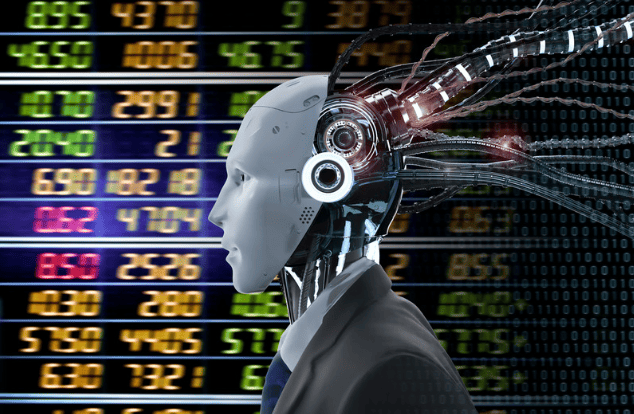
Discover the basics of AI trading, its applications in markets like forex and cryptocurrencies, and how it can improve trading efficiency. Learn about AI trading strategies, risk management, and how to get started with this innovative approach to investing.
What is AI Trading?
AI trading leverages artificial intelligence and machine learning algorithms to analyse vast amounts of data, identify trends, and make real-time trading decisions. Unlike traditional trading, which relies on human judgement, AI trading relies on data-driven decisions, reducing human error and potentially increasing profitability.

We are especially seeing more instances of AI trading in the UAE region. As the region is increasingly becoming a hub for fintech and AI-driven solutions, traders in the region are increasingly turning to the use of AI in trading to stay competitive in today’s volatile markets.
Data-Driven Decisions
AI trading algorithms use vast amounts of historical and real-time data to make informed decisions.
Reduction of Human Error
By relying on algorithms, AI reduces human bias and emotion, aiming for precision and consistency.
Scalability and Speed
AI trading systems can process large volumes of data and execute orders across various markets almost instantaneously.
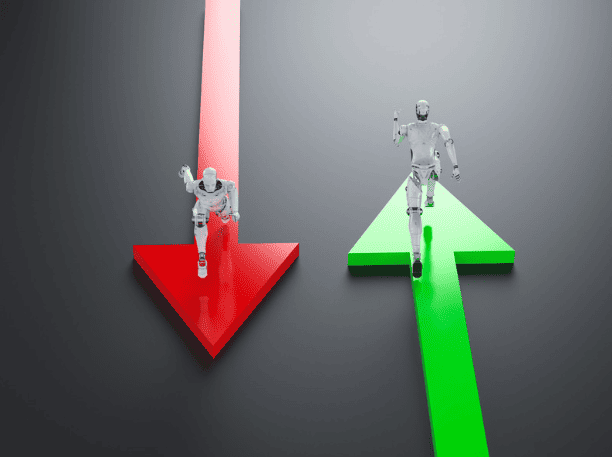
How Does AI Trading Work?
AI trading involves multiple components and processes that work together to analyse market data and execute trades efficiently.
Data Collection and Analysis
AI systems gather data from a variety of sources, including stock prices, forex rates, and economic news. This data is then analysed using machine learning techniques to identify patterns and predict future market movements.
Automated Trading Systems
Automated trading systems execute trades based on pre-set criteria, removing the need for constant human monitoring. Traders can set specific conditions for buying or selling, such as price levels, trading volume, or specific technical indicators.
Algorithm and Strategy Design
AI algorithms are trained using machine learning models to follow specific strategies. These include:
Momentum Trading
AI buys assets that are trending upwards and sells those trending downwards.
Mean Reversion
This strategy assumes that asset prices will revert to their mean over time.
High-Frequency Trading (HFT)
Uses AI to execute a large number of orders at extremely fast speeds, capturing small price differences.
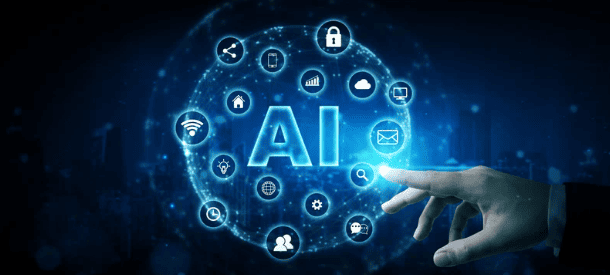
Key Applications of AI Trading
AI trading is applied across various asset classes, making it a versatile tool for traders.
Stock Trading
In the stock market, AI analyses historical data, news sentiment, and technical indicators to identify trends. This helps traders make informed decisions on which stocks to buy or sell.
Forex Trading
AI is particularly effective in forex trading, given the high volatility and volume of the currency markets. It can predict currency pair movements and provide real-time insights for profitable trades.
Cryptocurrency Trading
The cryptocurrency market is known for its rapid price changes. AI trading systems can react faster than human traders, helping them capture opportunities in this fast-paced market.
Commodity and Futures Trading
AI analyses market trends and uses predictive analytics to guide trading in commodities like gold, oil, and agricultural products.
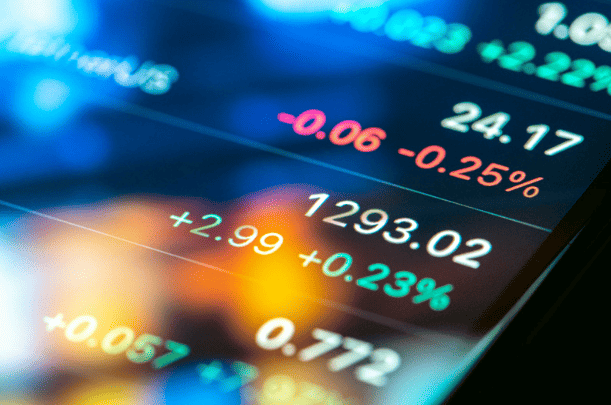
How to Use AI to Enhance Trading Performance
AI trading systems provide numerous benefits that can help traders achieve their financial goals more efficiently.
Real-Time Market Reactions
AI algorithms can process and respond to market changes instantly, offering traders the advantage of acting on new information without delay.
Enhanced Precision and Reduced Errors
AI can follow trading rules with precision, reducing the likelihood of mistakes due to human error.
Risk Management and Portfolio Allocation
AI can assess risk factors and adjust portfolio allocations accordingly. For instance, it can limit exposure to high-risk assets or diversify portfolios to mitigate risks.
Continuous Monitoring and Strategy Adjustment
AI systems can automatically adjust trading strategies based on market conditions, ensuring that traders can stay ahead of trends without constant manual intervention.
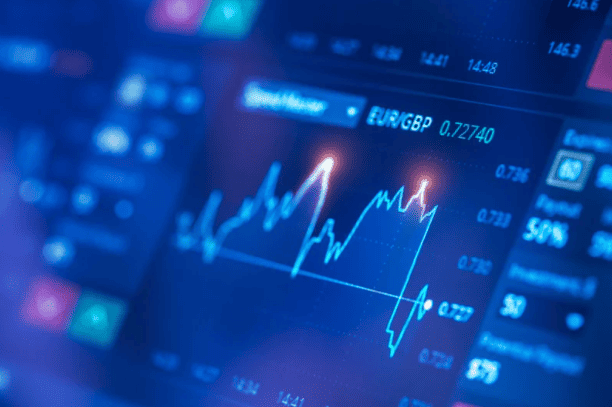
Benefits of AI Trading
Increased Efficiency
AI reduces the time and effort needed for market analysis.
Emotion-Free Trading
AI eliminates emotional biases, such as fear or greed, that can lead to poor decisions.
24/7 Market Access
AI allows for trading in global markets at all hours, making it suitable for volatile markets like forex and cryptocurrencies.
Getting Started with AI Trading
For those looking to start AI trading, here are some essential steps to consider:
Choose the Right Trading Platform
Select a platform that supports AI trading tools, such as MetaTrader or QuantConnect, which offer a range of AI-compatible features.
Learn Programming and Algorithm Design
Programming skills, particularly in Python, are essential for developing and customising AI trading algorithms.
Understand Market Dynamics and Risk Management
Familiarise yourself with market structures, risk management principles, and trading strategies.
Develop and Backtest Your System
Create a trading algorithm and conduct thorough backtesting to ensure it performs well under different market conditions.
Future Trends and Opportunities
AI trading is constantly evolving, with new technologies and strategies emerging regularly. Future trends include:
Integration with Blockchain
AI combined with blockchain can increase transparency and security in trading.
Quantum Computing
Emerging technology that could revolutionise the speed and complexity of trading algorithms.
Further Automation
As AI systems become more advanced, traders can expect even more sophisticated tools for managing and executing trades.
Algo Forest in the UAE
As part of our expansion into the UAE region, Algo Forest is proud to have been invited by the Abu Dhabi Investment Office (ADIO), a milestone that reflects our role as a growing force in the AI and fintech sectors.
We’re also excited to announce that we will be exhibiting at GITEX Global 2024, taking place at the Dubai World Trade Centre from October 14–18, 2024. Our team will be on-site to showcase the power of AI-driven algorithmic trading systems and demonstrate how algo trading is shaping the future of financial markets.
This event supports our broader mission to make algorithmic trading accessible to everyone in the UAE, whether you’re a retail trader or an institutional investor.
Final Thoughts
Whether you’re in Dubai, Abu Dhabi, or anywhere across the UAE, Python trading opens up a powerful new way to engage with the markets.
Visit our booth at GITEX Global 2024 to see our solutions in action — or get started online today.
Learn more at AlgoForest.com and discover how our online algorithmic trading courses can help you turn code into capital.
Frequently Asked Questions About AI Trading
Q1. What is AI trading?
AI trading uses artificial intelligence to analyse market data, identify trends, and execute trades automatically, aiming to improve trading efficiency and reduce errors.
Q2. How much capital is required to start AI trading?
While this varies, beginners in Hong Kong might start with a smaller investment of HK$10,000-HK$50,000, depending on the trading platform and chosen markets.
Q3. What types of strategies can be implemented with AI trading?
Common strategies include momentum trading, mean reversion, and high-frequency trading. Traders can customise AI algorithms to suit their preferred strategy.
Q4. Is AI trading suitable for beginners?
Yes, beginners can start with user-friendly AI trading platforms. However, some knowledge of programming and trading fundamentals is helpful for effective use.
Q5. What are the risks associated with AI trading?
AI trading involves risks, such as reliance on data quality and market volatility. It’s essential to regularly monitor and adjust AI strategies.
Q6. Can AI be used for forex and cryptocurrency trading?
Yes, AI is particularly useful in volatile markets like forex and cryptocurrencies, as it can react swiftly to price changes and execute trades in real-time.
Q7. Do I need programming skills to use AI trading?
Basic programming skills, especially in Python, are helpful but not essential, as many platforms offer pre-built algorithms and user-friendly interfaces.
